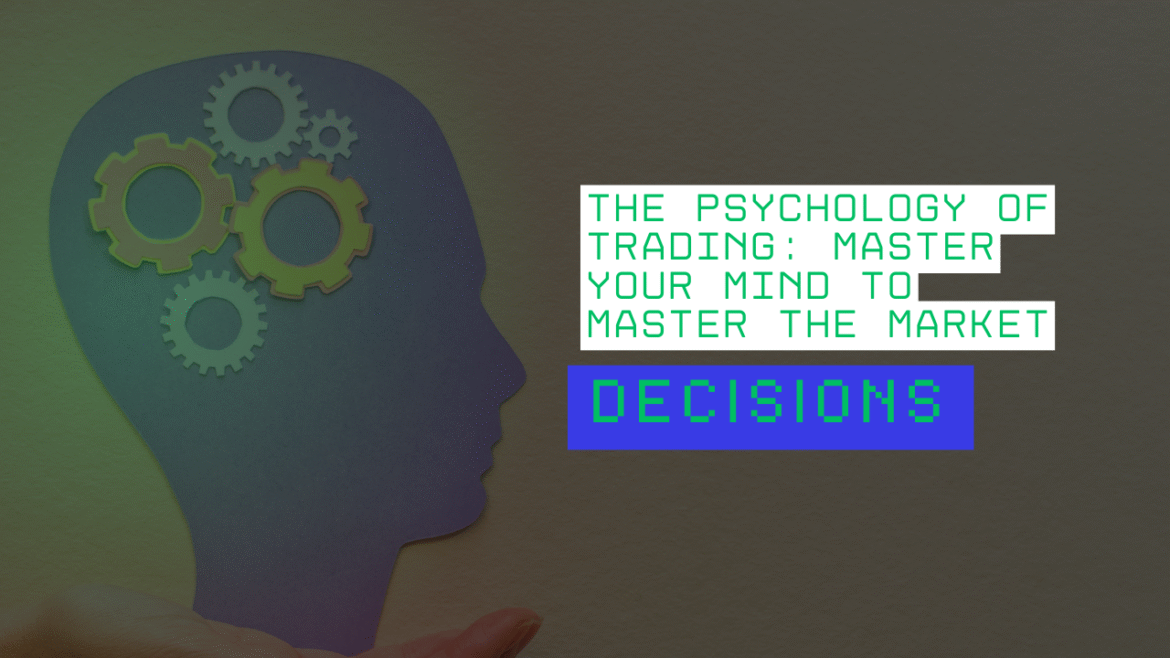Trading in the stock market is as much a mental game as it is a financial one. While strategies, analysis, and market knowledge are critical, your ability to manage emotions and maintain discipline often determines success or failure. This blog post explores the psychology of trading and offers practical tips to master your mind, helping you navigate the market with confidence and clarity.
Why Psychology Matters in Trading
The stock market is driven by human behavior, with prices reflecting collective emotions like fear, greed, and hope. Traders who succumb to these emotions often make impulsive decisions, such as buying at market peaks or selling during dips. Mastering your psychology allows you to stay rational, stick to your plan, and avoid costly mistakes.
Common Psychological Traps in Trading
Understanding the mental pitfalls that traders face is the first step to overcoming them. Here are the most common psychological traps:
1. Fear of Missing Out (FOMO)
FOMO drives traders to chase trending stocks or jump into rallies, often at inflated prices. This impulse can lead to buying high and suffering losses when the hype fades.
- Example: Seeing a stock skyrocket and buying in without research, only to watch it crash shortly after.
2. Loss Aversion
Traders often hold onto losing positions too long, hoping to break even, rather than cutting losses. This stems from the human tendency to feel losses more intensely than gains.
- Example: Refusing to sell a declining stock because you don’t want to “lock in” a loss, even when the fundamentals deteriorate.
3. Overconfidence
After a few successful trades, traders may overestimate their skills, leading to risky bets or ignoring proper analysis.
- Example: Doubling down on a single stock because you “feel” it’s a winner, without considering diversification.
4. Herd Mentality
Following the crowd can feel safe, but it often leads to buying overvalued stocks or selling during panic-driven crashes.
- Example: Selling during a market downturn because everyone else is, even when your research suggests the dip is temporary.
5. Revenge Trading
After a loss, some traders make impulsive, aggressive trades to “win back” their money, often leading to even bigger losses.
- Example: Increasing trade size or taking high-risk positions immediately after a bad trade to recover losses.
Strategies to Master Your Trading Psychology
To succeed in trading, you need to cultivate mental discipline and emotional resilience. Here are practical strategies to help you stay in control:
1. Develop a Trading Plan and Stick to It
A well-defined trading plan acts as your roadmap, reducing emotional decision-making. It should include your goals, risk tolerance, entry and exit criteria, and position sizing.
- How to do it:
- Write down your plan and review it before every trade.
- Use stop-loss orders to automatically exit losing trades at predetermined levels.
- Avoid deviating from your plan based on market noise or emotions.
2. Practice Risk Management
Effective risk management protects your capital and keeps emotions in check. By limiting losses, you reduce the psychological pressure of trading.
- How to do it:
- Never risk more than 1-2% of your portfolio on a single trade.
- Diversify across stocks and sectors to spread risk.
- Use position sizing to ensure no single trade can derail your portfolio.
3. Keep a Trading Journal
Recording your trades helps you identify emotional patterns and improve decision-making. A journal tracks what worked, what didn’t, and how emotions influenced your choices.
- How to do it:
- Note the trade details (entry/exit prices, rationale, outcome).
- Reflect on your emotional state during the trade (e.g., anxious, confident).
- Review weekly to spot recurring mistakes or biases.
4. Embrace Losses as Part of the Process
Losses are inevitable in trading. Accepting them as learning opportunities rather than failures builds mental resilience.
- How to do it:
- Focus on your overall strategy, not individual trades.
- Analyze losses to understand what went wrong and how to improve.
- Remind yourself that even professional traders experience losses.
5. Cultivate Patience and Discipline
Successful trading requires waiting for the right opportunities and sticking to your strategy, even during volatile markets.
- How to do it:
- Avoid trading impulsively during periods of boredom or excitement.
- Use meditation or mindfulness to stay calm and focused.
- Take breaks after emotional trades to reset your mindset.
6. Limit Exposure to Market Noise
Constant news, social media, and market commentary can fuel emotional reactions. Filtering out noise helps you focus on your strategy.
- How to do it:
- Set specific times to check news or market updates.
- Avoid trading based on unverified tips or hype from social platforms.
- Rely on your research and analysis for decision-making.
Building a Winning Trader’s Mindset
Mastering your psychology is an ongoing journey. Here are additional tips to build a strong trader’s mindset:
- Set Realistic Expectations: Understand that trading isn’t a path to instant riches. Aim for consistent, incremental gains.
- Stay Educated: Continuously learn about markets, strategies, and psychology to boost confidence and reduce fear.
- Maintain Balance: Trading shouldn’t consume your life. Prioritize physical health, relationships, and hobbies to stay grounded.
- Seek Support: Join trading communities or work with a mentor to share experiences and gain perspective.
Final Thoughts
The psychology of trading is the invisible force that separates successful traders from those who struggle. By understanding common psychological traps and adopting disciplined strategies, you can master your mind and make rational decisions in the heat of the market. Start with a clear plan, manage risks, and commit to continuous self-improvement. With time and practice, you’ll not only master the market but also gain greater control over your emotions and financial future.
Disclaimer: Trading involves significant risks, and past performance is not indicative of future results. Always conduct thorough research and consider consulting a financial advisor before trading.


